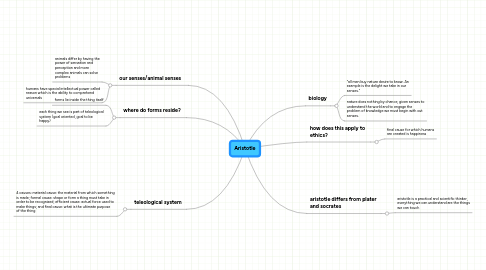Aristotle
by Teal Fink

1. our senses/animal senses
1.1. animals differ by having the power of sensation and perception and more complex animals can solve problems
1.2. humans have special intellectual power called reason which is the ability to comprehend universals
2. teleological system
2.1. 4 causes: material cause: the material from which something is made; formal cause: shape or form a thing must take in order to be recognized; efficient cause: actual force used to make things; and final cause: what is the ultimate purpose of the thing
3. where do forms reside?
3.1. forms lie inside the thing itself
3.2. each thing we see is part of teleological system (goal oriented, goal to be happy)
4. biology
4.1. "all men buy nature desire to know. An example is the delight we take in our senses."
4.2. nature does nothing by chance, given senses to understand the world and to engage the problem of knowledge we must begin with out senses.
5. aristotle differs from plater and socrates
5.1. aristotle is a practical and scientific thinker, everything we can understand are the things we can touch
6. how does this apply to ethics?
6.1. final cause for which humans are created is happiness


